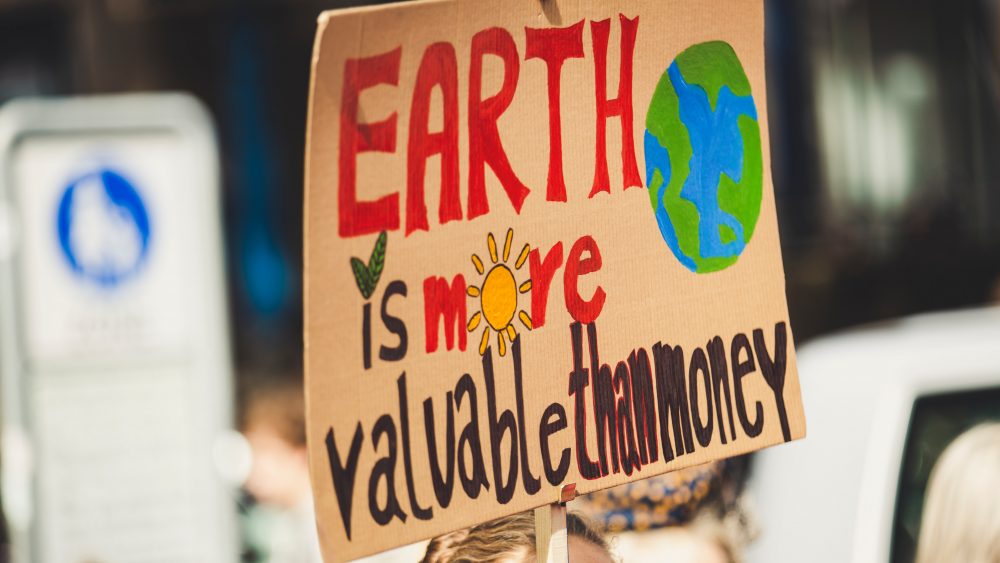Posted on 27 May 2020 by Christie Nicoson and Barbara Magalhaes Teixeira.
The views expressed in this publication are those of the authors and do not necessarily represent those of the Agenda 2030 Graduate School or Lund University. The present document is being issued without formal editing.
The Sustainable Development Goals outline a “shared blueprint for peace and prosperity for people and the planet, now and into the future”. However, this is not only ambitious; there appear to be inherent contradictions to reconciling the economic, environmental, and social goals. Goal 16 on Peace, Justice and Strong Institutions relies on the promotion of “sustainable development” to achieve environmental and social goals. The idea of sustainable development is deeply connected to economic growth. While there are benefits to economic growth, like for example decreased risk of conflict, this approach is reactive rather than transformative. Therefore, there is a need to reimage sustainable development as a transformative process in society to fight not only social and economic inequalities, but also climate change vulnerabilities. We suggest that degrowth ideas open key opportunities for environmental peacebuilding, such that peacebuilding processes might foster more peaceful societies as well as help communities address climate change.
Combining environment and peacebuilding
Environmental peacebuilding, recently embraced by the international community, is a field of research and practice that suggests that cooperation on environmental issues can address violent conflict as well as social and structural inequality – strong causes of conflict. Many countries said to face the greatest climate vulnerability also experience armed civil conflict. The UN General Assembly has stressed that post-conflict countries and those with limited natural resources will be greatly impacted by climate change. Environmental peacebuilding allows the possibility of simultaneously considering challenges of building peace and addressing climate change.
Evidence (e.g. here and here) shows that although environmental peacebuilding efforts often call for climate sensitivity, the field has largely focused on economic growth, prioritizing resource extraction, economic recovery, and livelihood creation in post-conflict contexts. Despite some benefits, economic growth comes under critique for inadequacies in light of persisting global challenges such as suffering planetary health, rising global inequalities, and even the stagnation of human well-being in relation to growth after a certain threshold (e.g. here and here).
This dissonance between goals of environmental peacebuilding and reliance on economic growth poses a challenge for sustainable peace. If environmental peacebuilding strategies rely on economic growth and post-conflict economic recovery in order to facilitate peace, this approach may be impractical and potentially harmful in light of climate change. Moreover, relying on economic growth for building peace perpetuates a system that leads to conflict in the first place: reproducing environmental injustice, unequal access to natural resources, inadequate accounts for indigenous land rights, and social inequalities. If environmental peacebuilding aims to foster peace in relation to environmental issues – both to enhance resilience to climate impacts and avoid further contributing to harmful climate change – aligning peacebuilding with climate action should take priority.
What alternatives?
If environmental peacebuilding should account for climate change, there seems to be potential in moving beyond reliance on economic growth. For example, environmental peacebuilding might gain lessons from degrowth proposals. Degrowth is a field of political and social action and philosophical ideas about transitioning to a new economic model focused on justice and sustainability, instead of economic growth. Degrowth proposals focus on equal distribution of wealth, resources, and power combined with downscaling of throughputs. Energy and material production and consumption would decrease, leading to a decline in natural resource and labor use in line with climate limitations.
Degrowth proposals take many forms. They might look like progressive taxes to enforce maximum and minimum income and wealth, job guarantees, reduced work hours, community currencies, or voluntary activities. In such a society, care, education, health, and environmental services would be restored and prioritized; credit and money transitioned to public rather than private entities; and ‘green’ sectors prioritized alongside fossil fuel divestment.
Including degrowth approaches in environmental peacebuilding could help promote a sustainable and inclusive peace. Building sustainable peace should not only entail an absence of violence, but also processes to transform unsustainable processes and structures that allow for the emergence of conflict in the first place. Promoting peace that strives for development through economic growth and continued exploration of natural resources poses major questions to the natural limits of the planet and exacerbates situations of environmental injustice and vulnerabilities to climate change.
For peace to be sustainable and inclusive, it must promote democratic representation, fair and equal distribution of resources in the society, and care for the environment. This kind of peace is based on a notion of well-being rather than economic productivity. By connecting degrowth and environmental peacebuilding, it is possible to close the gap between the present structural issues, and to foster an equal and inclusive society that thrives under sustainable peace.
This blog post stems from authors’ related coursework in connection with the Lund University Agenda 2030 Graduate School.

